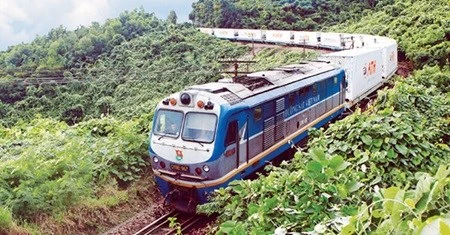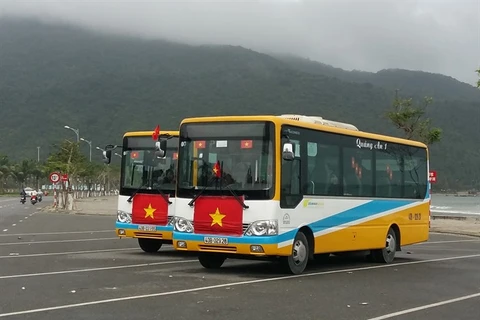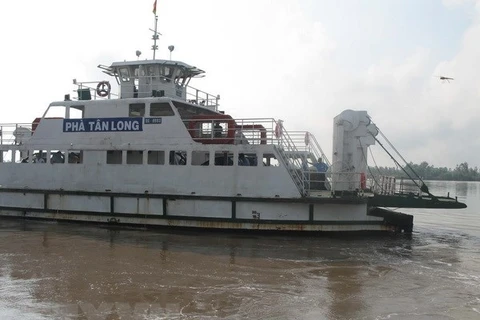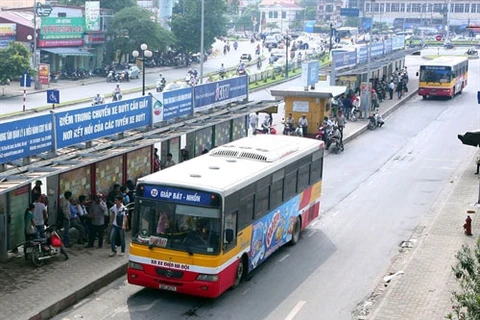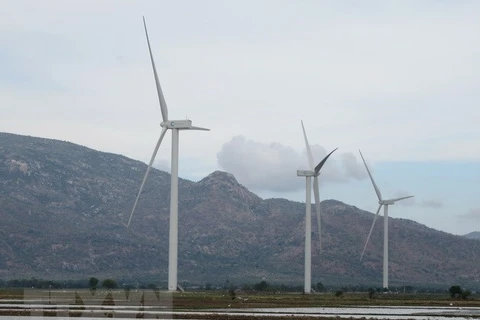Hanoi (VNS/VNA) - Illegal coach and bus services are a big concern for the country, despite the authority’s best efforts to put the brakes on those flouting the law.
In the capital city, illegal vehicles can be easily observed cruising the streets and violating the rules as the demand for commuting options increases day by day, especially during holidays, Kinh Te & Do Thi (Economic & Urban Affairs) newspaper reported.
Transport experts said the illegal vehicles and stations were one of the reasons that lead to the slowing down of road transportation development.
According to Do Xuan Hoa, Vice Chairman of the Vietnam Automobile Transport Association, there was a reduction of fixed routes to inter-provincial passenger transport services in recent years.
Instead, services were shifted to passenger transport contracts. This means buses and coaches did not run on fixed routes but changed based on passengers’ demands, which resulted in a boom of 10-seater cars operating passenger transport services.
“The car owners had registered to run business as contract transport services. But in fact, their service was operated on fixed routes,” said Hoa. “The service was a sort of illegal coaches and buses,” he said.
However, the management authority is not properly addressing the issue, he added.
Nguyen Anh Dung, Chairman of the Vietnam Coach Station Association, agreed and said that the situation has been the same for the past 10 years.
“The illegal service must have been protected and covered by some shady forces,” Dung said.
“If any authority official claimed to not notice the situation, he or she should be investigated,” he said frankly.
With experiences as director of Hanoi’s Giap Bat Bus Station, Dung said the current management style for bus stations was causing a loophole for illegal coaches and buses to abuse.
For example, a business who submitted files for registering routes had to buy vehicles first. This lead to situations that if the application was refused, many still operated their buses anyway, without the correct paperwork.
In addition with the problem of illegal passenger transport, work of planning and managing bus stations is also a concern to transport experts.
Dr. Nguyen Xuan Thuy, an urban traffic expert, said in the long term, Hanoi should maintain and expand the capacity of existing stations so as to meet the mounting demands of passengers.
Experts also wanted bus operations’ durations to be extended.
A bus station is a sizeable investment so investors needed enough time to recoup their capitals and earn profit, Dung said.
But the current regulation allowing a bus station to operate for only 20 years was unreasonable and not attractive to investors, Dung said.
Meanwhile, Dau Anh Tuan, head of legal department of the Vietnam Chamber of Commerce and Industry, said problems with transport services would hinder economic development due to high fees and weak connectivity between different means of transport, with road accidents frequently happening.
The key reason was lack of a proper legal mechanism and flexibility of State management.
Many regulations could be considered unnecessary, interfere with businesses’ operations and did not bring about effective management, said Tuan.
Vice Chairman of Hanoi’s Transport Association Bui Danh Lien suggested that the city consider plans of building an underground bus station beneath the Hanoi Railway Station so as to connect railways to bus routes to inner and outer city destinations.
Building central and satellite bus stations in densely populated areas were also necessary, said Lien.-VNS/VNA
In the capital city, illegal vehicles can be easily observed cruising the streets and violating the rules as the demand for commuting options increases day by day, especially during holidays, Kinh Te & Do Thi (Economic & Urban Affairs) newspaper reported.
Transport experts said the illegal vehicles and stations were one of the reasons that lead to the slowing down of road transportation development.
According to Do Xuan Hoa, Vice Chairman of the Vietnam Automobile Transport Association, there was a reduction of fixed routes to inter-provincial passenger transport services in recent years.
Instead, services were shifted to passenger transport contracts. This means buses and coaches did not run on fixed routes but changed based on passengers’ demands, which resulted in a boom of 10-seater cars operating passenger transport services.
“The car owners had registered to run business as contract transport services. But in fact, their service was operated on fixed routes,” said Hoa. “The service was a sort of illegal coaches and buses,” he said.
However, the management authority is not properly addressing the issue, he added.
Nguyen Anh Dung, Chairman of the Vietnam Coach Station Association, agreed and said that the situation has been the same for the past 10 years.
“The illegal service must have been protected and covered by some shady forces,” Dung said.
“If any authority official claimed to not notice the situation, he or she should be investigated,” he said frankly.
With experiences as director of Hanoi’s Giap Bat Bus Station, Dung said the current management style for bus stations was causing a loophole for illegal coaches and buses to abuse.
For example, a business who submitted files for registering routes had to buy vehicles first. This lead to situations that if the application was refused, many still operated their buses anyway, without the correct paperwork.
In addition with the problem of illegal passenger transport, work of planning and managing bus stations is also a concern to transport experts.
Dr. Nguyen Xuan Thuy, an urban traffic expert, said in the long term, Hanoi should maintain and expand the capacity of existing stations so as to meet the mounting demands of passengers.
Experts also wanted bus operations’ durations to be extended.
A bus station is a sizeable investment so investors needed enough time to recoup their capitals and earn profit, Dung said.
But the current regulation allowing a bus station to operate for only 20 years was unreasonable and not attractive to investors, Dung said.
Meanwhile, Dau Anh Tuan, head of legal department of the Vietnam Chamber of Commerce and Industry, said problems with transport services would hinder economic development due to high fees and weak connectivity between different means of transport, with road accidents frequently happening.
The key reason was lack of a proper legal mechanism and flexibility of State management.
Many regulations could be considered unnecessary, interfere with businesses’ operations and did not bring about effective management, said Tuan.
Vice Chairman of Hanoi’s Transport Association Bui Danh Lien suggested that the city consider plans of building an underground bus station beneath the Hanoi Railway Station so as to connect railways to bus routes to inner and outer city destinations.
Building central and satellite bus stations in densely populated areas were also necessary, said Lien.-VNS/VNA
VNA

